- News
- Reviews
- Bikes
- Components
- Bar tape & grips
- Bottom brackets
- Brake & gear cables
- Brake & STI levers
- Brake pads & spares
- Brakes
- Cassettes & freewheels
- Chains
- Chainsets & chainrings
- Derailleurs - front
- Derailleurs - rear
- Forks
- Gear levers & shifters
- Groupsets
- Handlebars & extensions
- Headsets
- Hubs
- Inner tubes
- Pedals
- Quick releases & skewers
- Saddles
- Seatposts
- Stems
- Wheels
- Tyres
- Tubeless valves
- Accessories
- Accessories - misc
- Computer mounts
- Bags
- Bar ends
- Bike bags & cases
- Bottle cages
- Bottles
- Cameras
- Car racks
- Child seats
- Computers
- Glasses
- GPS units
- Helmets
- Lights - front
- Lights - rear
- Lights - sets
- Locks
- Mirrors
- Mudguards
- Racks
- Pumps & CO2 inflators
- Puncture kits
- Reflectives
- Smart watches
- Stands and racks
- Trailers
- Clothing
- Health, fitness and nutrition
- Tools and workshop
- Miscellaneous
- Buyers Guides
- Features
- Forum
- Recommends
- Podcast
feature
Gravel bikes vs road bikes: what are the differences and which is best for you?
These days, drop-handlebar bikes come in many different forms, including road bikes, gravel bikes, cyclocross bikes, endurance road bikes, all-road bikes and even monster gravel bikes! To make things worse, not all brands stick to the same nomenclature and the lines between categories are more blurred than ever. The choice of a new bike can be bewildering, so here’s our guide to the ways in which gravel bikes and road bikes differ, and how to select the best one for you.
If you’re in the market for a new bike, then you might be asking yourself whether your money will be better spent on a road bike, or whether you should be listening to all the hype and getting a gravel bike instead. Well, over the last few weeks, I’ve been quizzing the road.cc team to see which bike they’d choose for their one-bike garage. I've also been putting the miles in on two almost identically priced bikes to see how big the differences actually are.
To keep things simple, we'll be comparing a £2,500 carbon-framed road bike to a £2,500 carbon gravel bike. Both come with components that are very typical for their intended use, and both are very competitively priced. If I had to choose just one of these bikes to ride for the next five years, which would it be? Well, by the end of this article, hopefully I will have decided just that…
> Should you buy a race bike or an endurance bike?
Not so very many years ago, the vast majority of drop bar bikes were designed for riding fast on tarmac. Representing the road bike corner today is the 2025 Orro Gold Evo. It has a carbon frame, it’s got a Shimano 105 mechanical groupset, and like most road bikes today it has disc brakes. It also has geometry that is fairly typical of an endurance bike. This, then, is a very strong choice for anyone wanting to munch miles on the road.
In the opposing corner, we have what is perhaps the biggest threat to road cycling since the mountain bikes came along: a gravel bike! The new 2025 Boardman ADV 9.2 to be exact.
It too has a carbon fibre frame and disc brakes, but instead of a double crankset, it’s got a single ring at the front. It’s also got space for up to 42mm tyres, and at the back you’ll find an absolute dinner plate of gears. Despite these differences, you can of course use this bike quite happily on the road as well as on the bumpy stuff. In fact, Boardman says its neutral 71.5-degree head angle delivers predictable handling on and off-road.
Having a gravel bike could open up a whole host of new routes, but what do you have to compromise for this go-anywhere attitude? Let's take a closer look at some more differences to find out.
The differences
When you look at these two bikes, some of the differences between them are immediately obvious, while others take some riding to really uncover. It basically boils down to four main points: geometry, tyre clearance, weight and gearing. Let's go through them in turn and see how they might influence your bike choice.
Geometry
Geometry isn’t everyone’s idea of a fun night in, but it is absolutely critical to not only how a bike rides and handles, but also how it feels.
Clearly, the road bike is designed for smooth tarmac, hence they are typically more aggressive than gravel bikes. For example, the front end is much lower on the Orro than it is on the Boardman thanks to this shorter headtube. That should mean that you can get into a more aerodynamic position and travel faster on open roads, but if you’re not interested in speed or aren’t very flexible, then more relaxed geometry might actually suit you better and be more comfortable.
> How to read a bike geometry table
Then we’ve got the lengths of the bikes. Again, the road bike is more aggressive with a longer top tube that stretches you out, making you more aerodynamic.
Then you’ve got the seat tube angle. On a road bike, it’s much more steep to put you further over the pedals for power output. On the gravel bike, things are more laid back. The front wheel is also further in front of you to stop you going over the bars on gnarly gravel descents.
You’ll also notice that in order to accommodate these wide tyres, the seat stays and wheelbase have to get bigger. This can make a bike feel less lively and agile, which would be a very bad thing if you were to ask a pro rider. In reality, it can actually help less experienced riders feel more stable and in control of the bike, especially on twisty descents.
Tyre clearance
As you probably already know, gravel bikes can fit much wider tyres than road bikes, even though in recent years they've been getting much more spacious on the latter. The general rule is that the bigger the obstacle you want your bike to get over, the more tyre volume you’re going to want.
If you plan on never venturing off paved roads, then you’re only going to need around 30-32mm of tyre clearance. If you want to ride on unpaved roads and light gravel, then around 32-40mm is going to be the sweet spot. If you want to ride on chunkier gravel, then I’d be looking at a bike with space for at least 42mm tyres.
> How much slower is a gravel bike on the road?
For reference, the Orro has space for 30mm tyres and the Boardman has space for 42mm rubber.
The only other thing to consider is that it’s always going to be possible to ride on the road with wide tyres, but riding off-road with skinny tyres just isn't going to end well. If you want to see how much slower gravel bike tyres are on the road, click the link above.
Weight
Our next difference between road bikes and gravel bikes is weight. There are exceptions to the rule, but in general gravel bikes are going to be at least a good few hundred grams heavier than the equivalent tarmac muncher.
So where are those differences? Well, firstly the frame is often a bit heavier, as it needs to have slightly thicker carbon to ward off rock strikes and the increased abuse of going off-road.
Secondly, the wheels. They’re generally heavier as they’re sometimes wider and have a higher spoke count, once again to make them more robust.
Finally, the groupsets can also often weigh more. Those big gravel cassettes aren’t light! Oh, and the increased tyre size can also contribute a surprising amount.
The result is that these almost identically priced builds vary in weight by about half a kilo. The Orro weighs 8.7kg and the Boardman about 9.2kg.
> How to make your bike lighter
Out in the real world that’s not going to make a massive difference to your performance, but if you are someone who likes to try and get up hills as quickly as possible, or want to challenge your mates on the local road ride, then clearly the gravel bike is going to be a disadvantage.
Gears
The final major difference that you’ll find between just about all road and gravel bikes is their gearing, so let’s open that can of worms!
This Orro has fairly typical gearing for a road bike with this 2X setup, so two chainrings at the front and 12 sprockets at the back. The Boardman gravel bike, meanwhile, has just one ring at the front and 12 sprockets at the back. Now, you might be thinking that this means you have loads less gears on the gravel bike, but actually gravel bikes tend to have more range.
The downside is that there are bigger jumps between the gears. That’s fine if you’re changing speed a lot, but it can make it harder to find a comfortable cadence during steady-state efforts. Personally I find these jumps just fine if I’m riding by myself when I can dictate my own speed, but if you’re riding with others then you might be forced to ride at a speed that you just can’t find the right gear for. In those situations, the closer spacing of the road bike gears are the clear winner.
The exact gearing will vary from bike to bike, but if we take these two as an example then you can expect to ride up to about 65kph or just under 40mph on the road bike gears before your legs are spinning uncomfortably fast, and about 55kph or just over 30mph on the gravel bike.
What do the road.cc staff think?
So what do we think? Well, I posed the question 'road bike or gravel bike?' to the road.cc team, and this is what they had to say…
Mat Page, who writes reviews for both road.cc and off.road.cc, reckons that gravel is the way to go. He’s sure that anyone with any off-road riding background would say the same if they had to choose just the one bike.
> Is a gravel bike the ultimate winter bike?
George, meanwhile, said that where he lives he would choose a road bike as there are far more quiet lanes for road riding than gravel routes nearby.
Tony, co-founder of road.cc, also voted for gravel, despite not actually riding much gravel. He reckons that a gravel bike offers a bit more versatility, especially the ones at the roadier end of the spectrum. He also pointed out that gravel bikes are great for commuting.
Emily added another vote for gravel, as did Dave who said he’d choose a quick gravel bike with a spare set of wheels.
It seems, then, that gravel bikes are a bit more than just an N+1 bike. When push comes to shove, they are that one bike to rule them all.
In summary
So after riding both of these bikes, do I agree? Would I also choose the gravel bike? Well, firstly I think I would be very happy on either of these bikes, but if I had to choose one then yeah, I think it would have to be the gravel bike.
Especially if you purchase an additional set of slick tyres, then a gravel bike can absolutely take the place of a road bike. Yes it will be a tiny bit slower, and yes the jumps in the gears will at times get annoying on the tarmac; but at the end of the day, although a slight compromise, it is more than up for the task.
Put the shoe on the other foot and the road bike is understandably the more capable machine on the road, but you simply can’t replace a gravel bike with it.
Maybe you don't want to ride gravel? Fine! But my commute, to give one example, is along a cycle path that just sort of runs out in places. It’s not me voluntarily choosing to ride gravel, it’s just me trying to take the flat way to work on this country's famously cr*p cycling infrastructure.
So how should you decide whether a road bike or a gravel bike is best for you? Well first, do you ever want to go off-road? If so then the gravel bike is the only one to go for. Secondly, are you interested in your average speed on the road? If yes, and you never venture off-road, then the road bike is undoubtedly going to help you increase your speed.
Third, are you going to ride on group rides on the road, or do you want to compete against other people? If so then this is the only time that I think the gravel bike with a set of slicks will really come unstuck.
The upside of all these categories merging and blurring is that there is the perfect bike for you out there. Endurance bikes are getting wider and wider tyre clearances, gravel bikes come in all kinds of forms from racey ones to multi-day adventure ones, and then there’s all-road bikes, a whole new genre that sits in the middle.
Let us know whether your next bike will be a road bike or gravel bike in the comments section below, and if you think a gravel bike can really replace a road bike.
Jamie has been riding bikes since a tender age but really caught the bug for racing and reviewing whilst studying towards a master's in Mechanical engineering at Swansea University. Having graduated, he decided he really quite liked working with bikes and is now a full-time addition to the road.cc team. When not writing about tech news or working on the Youtube channel, you can still find him racing local crits trying to cling on to his cat 2 licence...and missing every break going...
Latest Comments
- hawkinspeter 1 hour 13 min ago
The obvious answer to that question is whether you support genocide or not. It's similar to claiming that Nazis shouldn't be punched because that...
- chrisonabike 2 hours 14 min ago
The issue is we just end up with wider vehicles parked on the road because they won't fit the garage *, and it being more likely that drivers will...
- Pub bike 2 hours 41 min ago
He is up against the global trading system, which has obviously been in the news a lot lately. Framebuilders in other countries can undercut him,...
- David9694 4 hours 14 min ago
Stouport residents bemoan huge traffic queues through town...
- rookybiker 15 hours 8 min ago
The trailer seems to connect to both ends of the rear axle. Can it do tight corners without dragging the tyre sideways?
- froze 15 hours 11 min ago
Motorists have always been unkind to cyclists, but distracted driving is adding to the problem....
- Destroyer666 16 hours 4 min ago
Have you owned Bont shoes? In my experience even the widest Lake shoes have had a bizarre form of narrowing way too much in the toe area. But the...
- froze 16 hours 32 min ago
Not sure if this is possible, but this news letter goes out all over the world, and some places like Decathlon does not send stuff to America, in...
- Hirsute 17 hours 17 min ago
I'm confused as to why you'd need bib shorts indoors.
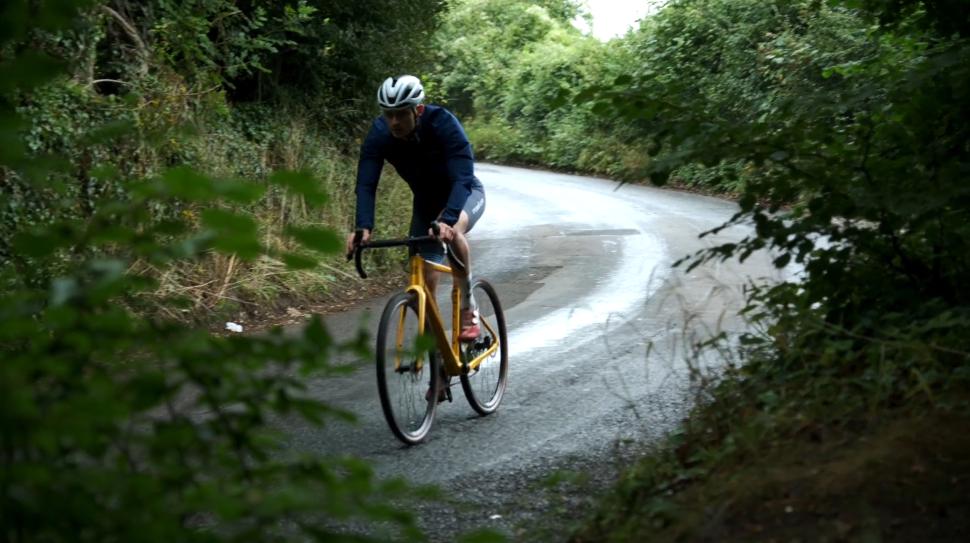




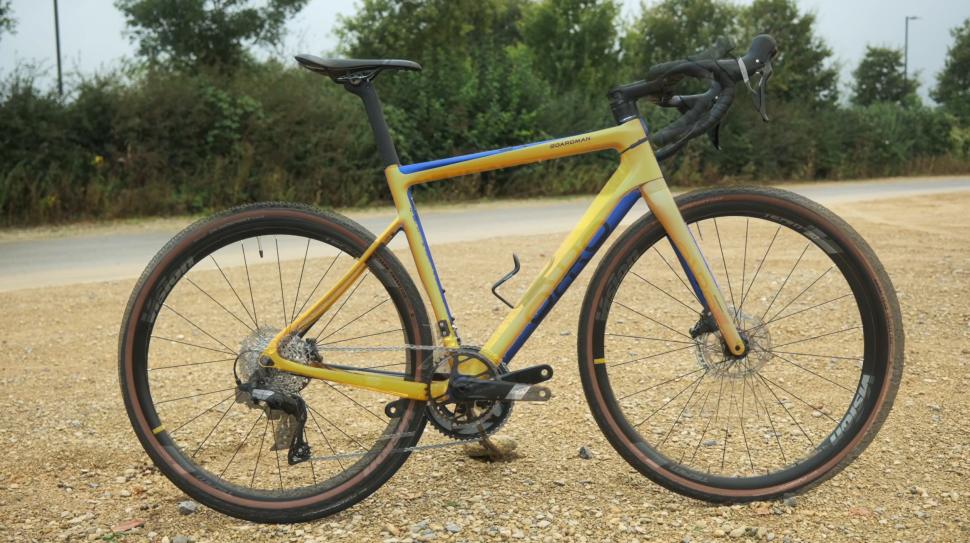
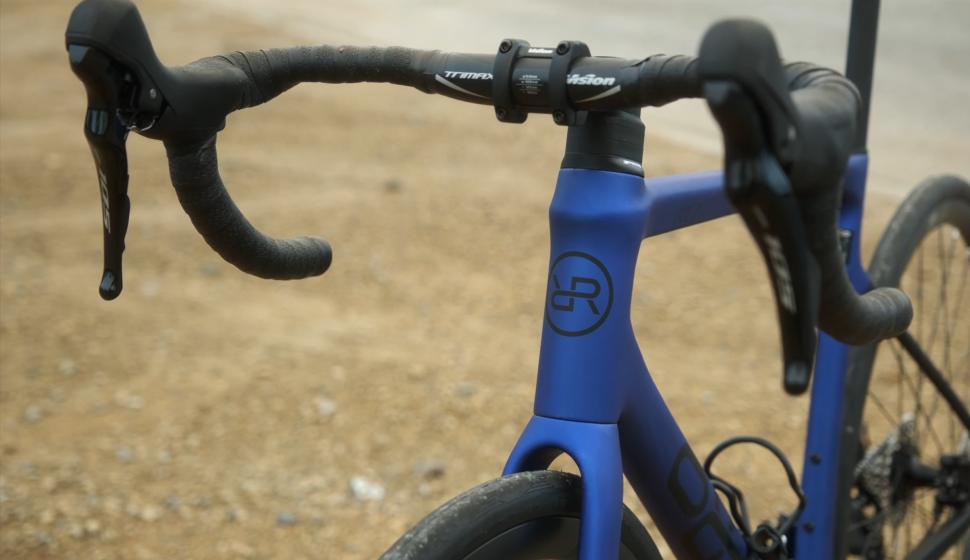








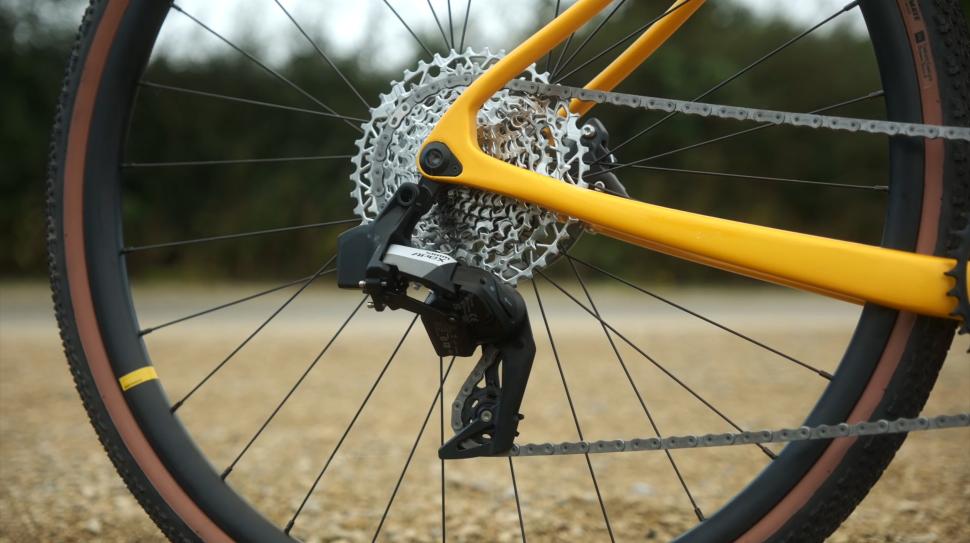

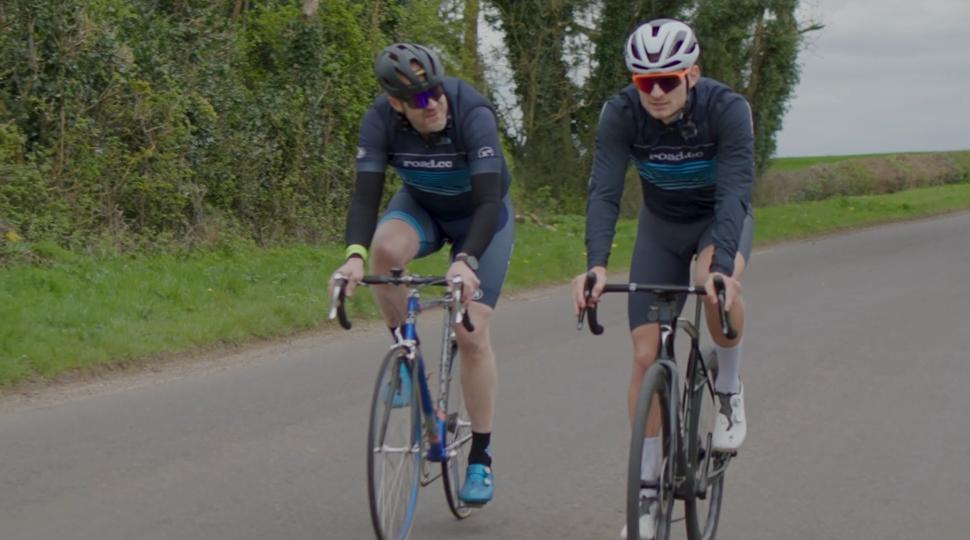
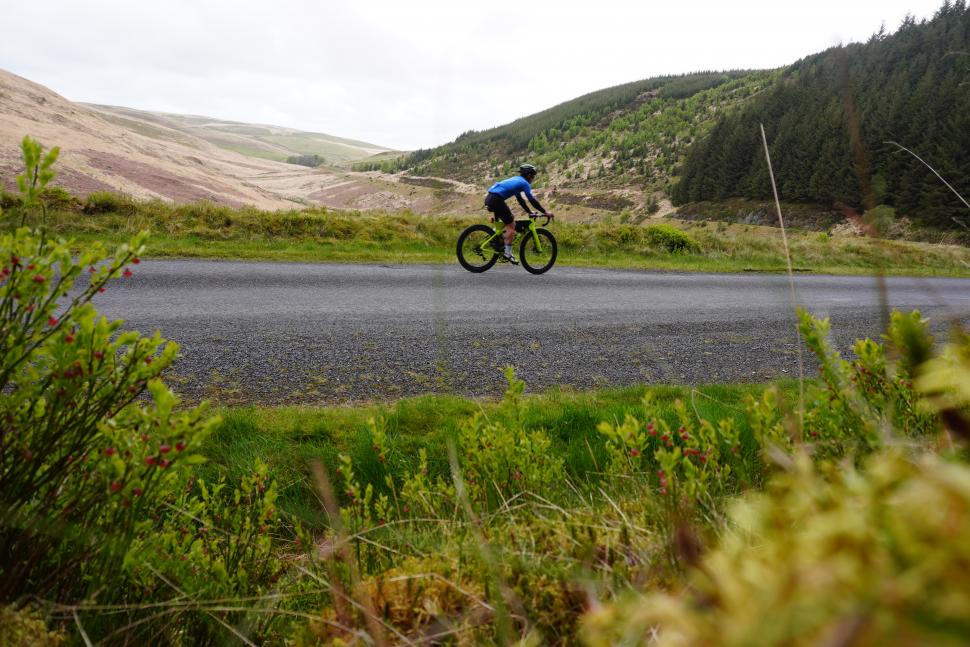
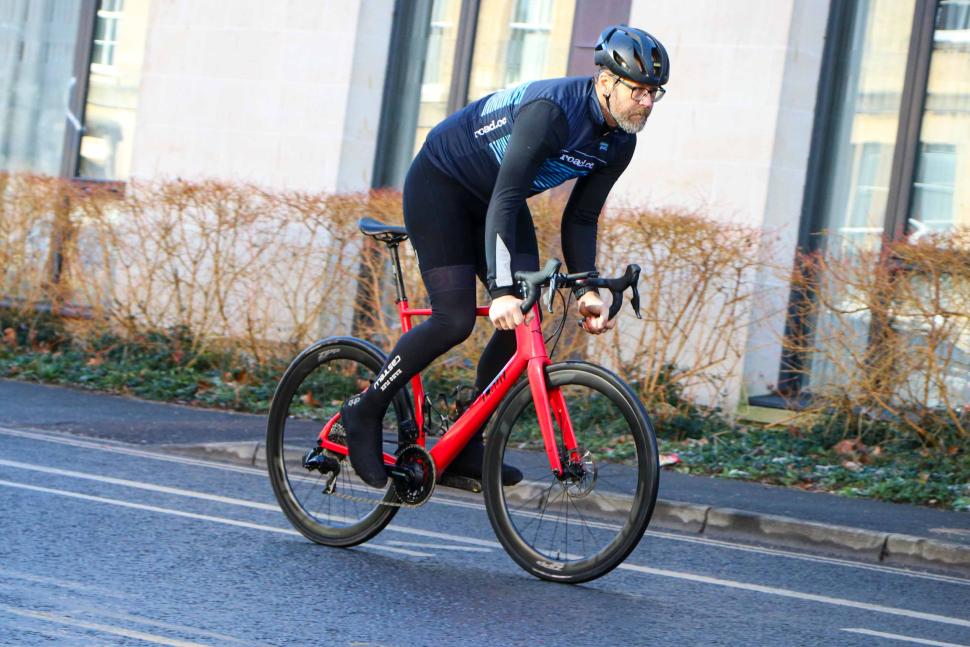
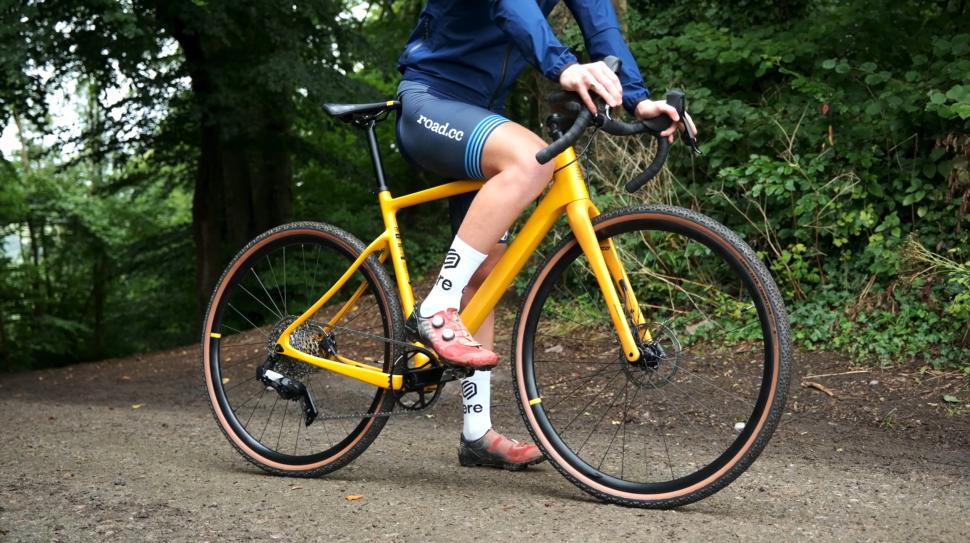


Add new comment
6 comments
If you can only afford one bicycle, get a gravel bike, and buy a second pair of narrower rims so you can put narrower tires with smooth tread so it will perform like a road bike on the road. If you can't afford the second pair of rims, then find the smoothest treaded tire, and the narrowest that will fit on your rim.
Try to find a gravel bike that has connections for panniers and fenders front and rear, just in case some point in the future you decide to go camping or touring on the bike. Make sure the fork has braze-ons for various attachments too.
I have one bike [gravel], and two sets of rims.
I used to mess about changing tyres ... but some rim / tyre combinations can make this a time consuming process [not to mention frustrating when you've struggled for a couple of hours only to find out the tyre is on backwards...], and it also increases the risk of damage to the rims as they are not really designed for constant tyre on, tyre off.
If you do go down the two rims option, I found it best to get the same brand and model [especially for the rear], and ensure that the cassettes and rotors are identical.
Get used to adjusting your disk brake mount as the rotors will wear differently due to different riding techniques and surfaces, and make sure you have a quality tool for your through axel as they are quite soft ... and again not designed for constant on/off action.
I fecked my rear eyelets with the constant pannier off / on, so ended up getting an Ortlieb Quick Rack and the additional mounting blocks [not for CF frames] ... what a difference. Rack on / off in about 15 seconds, and the optional mudguard clips in to the rack [and its pretty good too].
I also invested in a second seat post and seat ... so I have a standard seat post/ seat combination that I use on the road,.and a RedShift ShockStop and slightly softer saddle for the gravel. This stem has a blade type mudguard fixed to it, which helps ensure that the saddle goes back the the same place.
I run a rear camera, so each seat has a mounting under it.
My Garmin radarlight is permanently fixed to the frame, with a spare mount on my pannier bags.
Changing over from one use to another takes less than 10 mins ... proving the brakes align, and I've done the through axle up the same so the gears index correctly.
Sounds like lots of outlay, but it's stuff I've got over time and it works for me ... might not work for someone else.
I'd been kicking a few ideas around for a long time with the bike mechanic I use; anyway decided to press go last winter and built a gravel bike around a titanium frame (carbon fork, hand-built alloy wheels (tubeless 700x45 front/40 rear; Maxxis Rambler tyres), 1x11 GRX). My other bikes in that area are a steel road bike and hybrid (commuting, gen duties). Something more all-road was my plan (with light touring in mind; bikepack style) but the mechanic pushed me more down the gravel route ref wheels/tyres. Due to the weather I didn't really venture past commuting until May so felt somewhat road bike unfit, incl getting used to the new bike, heading off to a 3 week trip to France (Alps) and Italy (Tuscany). Got 5 good days on the road bike in France and then on to Tuscany to really test out the new bike. Even with light gravel tyres at 45psi I felt just as fast on tarmac as my road bike and the great thing was that 30 min before I'd been on single track/gravel (road bike would have just about coped with smooth gravel roads) so the new bike was a good punt. If I had a more lightweight road bike I may have found the gravel bike a bit slow on the road; some people I know complain that alloy gravel bikes can feel 'heavy'. I'm not a club rider but kind of feel (only from observations) that there's an 'arms race' on bikes there; lighter, more expensive bikes just to get that extra minute here and there. Not someone who gets obsessed by average speed. As per another comment, work out what kind of riding you enjoy/actually do. I enjoy the ability to just dive off down a tow path on the gravel bike but the road bike still gets used. The gravel bike has also done an overnighter on the Taff Trail. As I mainly use a hybrid for commuting because of the rack (not a fan of a hefty laptop laden rucksack) I rigged my road bike up with a removable rack so that it could be used on summer commutes and didn't feel too upstaged by the new gravel steed. If I've got some money burning a hole in my pocket I may look into a 2nd set of wheels (road optimised) for the gravel bike; I'm glad I was pushed more down the gravel route as the range of terrain the bike can cope with is impressive.
Obviously, none of the persons who were interviewed commute to work by bicycle and actually have only one bike. Or they live in Arizona.
I only have one bike and use it recreationally but also for my daily (longish) commute. Went through a couple of bikes over the years and made the obvious mistakes (full-on race bike etc).
The little accumulated wisdom that I can offer is to
a) pick something that can easily take full fenders and/or a removable rack,
b) no extreme geometries. Yes, you'll look like a million bucks but comfort is worth something especially if like me, you ride 50 km/day on your daily commute, regardless of the weather
c) prioritise leak-proof tyres over slick, fast but fragile rubber
d) bleeding edge stuff does not cope well with brutal conditions and lack of maintenance after each ride
e) if it's a commuter, imo you should seriously consider a hub dynamo. Half the year I ride in the dark.
I have a Marin Nicasio 2 that I bought to use as a commute bike along "smooth" gravel paths, some dodgy roads and some great roads. Running 32mm Vittoria RideAmour (tubeless- a first for me) and discs (another first for me). SKS mudguards, Shimano SPD's and I'm good to go. This is rapidly becoming the bike I use, more than the other 2 (Master XLight or E1). Comfy, fast enough when it needs to be, dry butt and (frier) feet in the rain and a breeze to walk around in, from bike shed to locker room and station concourse. The only thing that I do not like are the mounting points on the fork. Contemplating getting a Fairlight Strael and selling the other bikes although the Master is close to my heart.
Interesting read Jamie, thanks. Sounds like playing around with the rear sprocket selection on the gravel bike could pay dividends, or going 2X to get the range+ closer gearing.